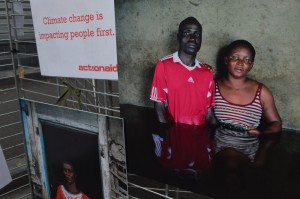 The Global Village of Alternatives, built in the outskirts of Paris during the COP21 negotiations, offers a harsh critique of current policies and a vision of what can be done to stop climate change if the will, creativity and determination exist. Here, dozens of grassroots organizations from countries all around the world present their arguments for stronger efforts to stop climate change and offer ground-up solutions based on traditional knowledge and new technologies. These collective and viable solutions mark a path forward as official negotiations fall short of assuring the planet’s future.
The Global Village of Alternatives, built in the outskirts of Paris during the COP21 negotiations, offers a harsh critique of current policies and a vision of what can be done to stop climate change if the will, creativity and determination exist. Here, dozens of grassroots organizations from countries all around the world present their arguments for stronger efforts to stop climate change and offer ground-up solutions based on traditional knowledge and new technologies. These collective and viable solutions mark a path forward as official negotiations fall short of assuring the planet’s future.
Small farmers from the French Confederation Paysanne set up a market in the Global Village to sell goods produced with a food sovereignty model.
Representing millions of farmers from every continent, Grain and La Vía Campesina presented a comprehensive food sovereignty proposal called Five Steps to Cool the Planet and Feed its People. The proposal stresses that between 44 and 57% of greenhouse gases come from industrial food production, small farmers can make a huge difference in ending global warming.
The steps of the proposal are: 1) to protect the earth, 2) to use non petroleum-based fertilizers and pesticides,, 3) to consume food produced by local farmers, 4) to return land to farmers, and 5) to reject false solutions, like transgenic cultivation and biofuels.
According to the Climate Action Network, which includes the Heinrich Böll Foundation, Friends of the Earth, France Nature Environment, Greenpeace and the “Stop Nuclear Power” network, nuclear energy is also a false solution to climate change.. The organization argues that first, contrary to what many people believe, generating electricity through nuclear fission emits greenhouse gases. This occurs in the process of extraction and enrichment of uranium; in the fabrication, transport and storage of fuel; and in the construction and dismantlement of nuclear power plants, although emissions from nuclear power plants are lower than those from coal, petroleum and shale gas.
The principal disadvantage of nuclear energy is that it creates enormous problems compared to those that it resolves: radioactive contamination, nuclear weapons, terrorism, toxic waste (there are 300,000 tons of used fuel deposited in radioactive landfills around the world whose effects will last thousands of years) and the inevitability of terrible accidents—from Three Mile Island to Chernobyl to Fukushima.
France generates 86% of its energy from nuclear power. The energy map of the country shows almost two dozen active or suspended power plants, multiple uranium mining operations, radioactive material deposits and centers of activity related to nuclear weapons. The nation has an aircraft carrier capable of firing nuclear missiles and six nuclear battle submarines.
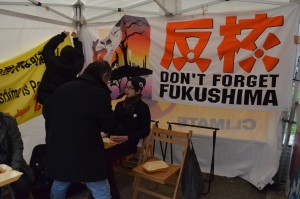 The voices of Fukushima also resonated in the Global Village. More than 160,000 people were evacuated after the nuclear accident. It is estimated that there will be 5,000 cancer fatalities provoked by radiation. More than 12,000 workers were exposed to high levels of radioactivity. Thirty out of every 100,000 people have developed thyroid cancer, in contrast with the rate of 1.7 in the rest of Japan. Infant mortality increased in 2012.
The voices of Fukushima also resonated in the Global Village. More than 160,000 people were evacuated after the nuclear accident. It is estimated that there will be 5,000 cancer fatalities provoked by radiation. More than 12,000 workers were exposed to high levels of radioactivity. Thirty out of every 100,000 people have developed thyroid cancer, in contrast with the rate of 1.7 in the rest of Japan. Infant mortality increased in 2012.
From Africa, native peoples displayed traditional technologies to solve global warming. African countries have revived the Nubian Vault, an ancient construction technique based on local materials and adapted to confront climate change. The technique has been applied in Senegal, Mali and Ghana, where it generates dignified livelihoods and employment. It also complies with mitigation criteria because it doesn’t require metal or concrete stair rods, large emitters of greenhouse gases.
Women on the March Against Climate Change
The World March of Women wended through the Village, proclaiming its motto: without feminism, there will be no climate justice. The global organization argues that capitalism uses patriarchal structures and processes of accumulation to maintain class, race and gender domination and irrational exploitation of natural resources. Its members vowed to maintain and extend their fight to transform the structures that generate inequality and poverty and cause climate crisis.
The African Women’s Development Fund celebrated rural African women as guardians of seeds, food and traditional knowledge to adapt to and resist the ravages of climate change. Women’s traditional knowledge has an important status in rural African communities because it plays a central role in the food system, ritual practices and government.
The group affirms that colonialism brought with it a Victorian vision of women that conceived of them as best suited for domestic work, while men performed the more serious work in the economic and political spheres. Free-market policies have ushered in foreign corporations whose goods and services have hurt local producers, further increasing poverty.
The ecological vision has brought with it a new commitment to work with the communities to restore and protect indigenous knowledge, save native seeds and maintain sacred sites, and to restore the rights of women and their central role in the life of the communities.
Seeing it as a System
The organization Attac has played a fundamental role in mobilizing against the hegemony of finance capital and the commodification of the world, and in favor of the construction of an active democracy, the convergence of social movements and for people to take power in their lives.
Attac has developed an analysis that stresses how neoliberal globalization, based on “liberalization” of trade and financial markets, has led to the total domination of finance over society. The system is designed to enrich a small minority of investors at the expense of the rest of the population and the planet. Its effects are harmful to human rights, biodiversity, north-south solidarity and democracy.
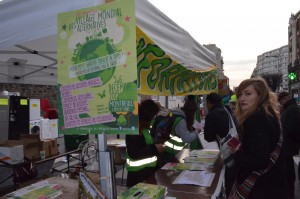 Attac affirms that there are alternatives against the damage caused by globalization and the cynicism of the elites. Conceived as a popular education movement that participates in civic action, it highlighted a campaign in the Global Village against the Transatlantic Free Trade Area (TAFTA). If approved, the treaty would diminish tariff protections and the sanitary norms of the European Union. It would lead to the commodification of new sectors of the economy and an unprecedented attack against democracy. The multinationals would paralyze the ecological transition.
Attac affirms that there are alternatives against the damage caused by globalization and the cynicism of the elites. Conceived as a popular education movement that participates in civic action, it highlighted a campaign in the Global Village against the Transatlantic Free Trade Area (TAFTA). If approved, the treaty would diminish tariff protections and the sanitary norms of the European Union. It would lead to the commodification of new sectors of the economy and an unprecedented attack against democracy. The multinationals would paralyze the ecological transition.
At the climate summit, Attac distributed “A Little Militant Guide to Confront Climate Crimes”. Along with the Observatoire des Multinationales, it edited Lobby Planet Paris, Climate Criminals and the Commodification of the COP21.
Attac asks the question: “Who finances the COP21?” The response—France’s biggest polluters:Michelin, Airfrance, Engie, Axa, Generali, Renault-Nissan, Suez and others.
Michelin is implicated in land grabbing and recognized as a specialist in greenwashing (attempting to build a public image by using false environmental claims). Airfrance promotes carbon markets and opposes measures to limit contaminating emissions from its planes. Engie is a beneficiary of the coal industry and other dirty energies. Axa speculates on climate catastrophes. Generali is a big financier of polluting energy. Renault-Nissan is pro-nuclear and lobbies against limits on car emissions. Suez leads lobbying in favor of fracking.
Attac forms part of the Collective for a Citizen Transition, together with 14 other organizations, like Alternatiba, Los Amigos de la Tierra, Énergie Partagée and the Association pour la Maintien d’une Agriculture Paysanne. All share three premises: a social, environmental and human transition is happening; there are many citizen movements creating pressure for change in many lands; people are acting all around the world in specific ways, reinventing our ways of producing, sharing, living, feeding ourselves, moving and educating children.
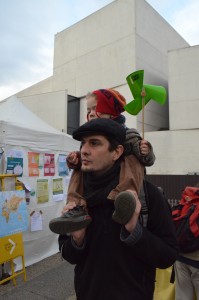 Faced with a crisis of the system, it’s a critical time to amplify the issues and work toward a profound transformation of society.
Faced with a crisis of the system, it’s a critical time to amplify the issues and work toward a profound transformation of society.
The ideal world for the promoters of trade agreements is a paradise for polluters that sabotages the energy transition. The first step is to impose the clauses in the agreements and then later they use these clauses to torpedo countries while waiting for legal complaints to be processed. This is the conclusion of a study by AITEC (Asociación International de Técnicos, Expertos e Investigadores).
Oil Watch called for the establishment of the Zero Annex in the new climate change treaty. The annex would contain the nations, regions and local areas–especially indigenous peoples, peasants, fishers and traditional communities–that are making real efforts to protect the climate. This annex or group should be created for the peoples and territories that are dealing with the real cause of climate change–the addiction to fossil fuels–and should establish protection, recognition and incentives.
The criteria and indicators for including members in this annex would be to leave fossil fuels in the ground, to practice lifestyles based on a respectful dialogue with nature, to fight against coal and other exploitations that affect the climate, to establish steps that the energy debate requires—why, for who and how much—in the exercise of sovereignty of peoples and territories, the refusal of REDD+ carbon markets and other false solutions to climate change and to have a clear determination against extraction and for emancipation of fossil fuels.
The Solidarity Committee with Cajamarca promotes support for the resistance of the communities of the north of Peru against the mega mining project by the transnational company CONGA in the Andes. Four years of resistance, with the slogan ¡Agua sí, oro no! and the people of Atahualpa don’t back down and inspire fights against extractivism in Latin America and the world.
Anyone who looks at the graphic of the effects of extractive industries on food systems, made by the Gaia Foundation and the African Biodiversity Network, will be overwhelmed. Mining impacts agriculture in many harmful ways, including contaminating the ground, ecosystems, the water, the air and the climate.
The harms are divided according to the stages: exploration, development, operation and closure. The damage ranges from CO2 emissions by machinery, deforestation, toxic leaks, massive reductions in the amount of water available, acid, heavy metals, radioactive decay, poisoning of rivers, lakes and groundwater, suspended particles, volatile organic compounds and much more.
Enercoop, the militant energy group, sustains that it is possible to move towards generating 100% renewable energy. To demonstrate it, he promotes the formation of cooperatives for the production of hydraulic, wind, photovoltaic and biomass energy.
The statute of the cooperative guarantees a transparent and democratic functioning. Also, it permits the involvement of all participants, including consumers, producers, collectives and workers, in the decisions of the cooperative whose benefits will impact the development of their territory.
This year, Enercoop will have produced more than 110 million gigawatt-hours of energy for 25,000 customers.
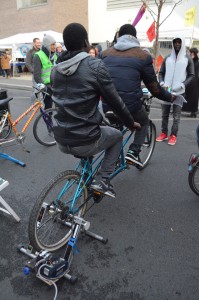 In France, there is a Federation of Bicycle Users, dedicated to helping cyclists and protecting their rights. It also distributes materials with specific recommendations to avoid risks to cyclists, demands better conditions for cyclists and shares information about available financial help.
In France, there is a Federation of Bicycle Users, dedicated to helping cyclists and protecting their rights. It also distributes materials with specific recommendations to avoid risks to cyclists, demands better conditions for cyclists and shares information about available financial help.
The Center for the Communitarian Economy and Social Development of Rajasthan, India, reimagines alternatives for the people in their struggle against the effects of climate change. It defines the climate crisis as a crisis between the crisis of opulence and the crisis of desires. If we can’t resolve the development deficit of the majority and inequality, a resolution to the climate crisis will be very difficult.
The role of policy in solving the climate crisis is enormous and some aspects of justice can’t be approached from a global or national level unless the rich communities give atmospheric space to the growing communities. However, there is no conflict in looking to tradition for solutions and local alternatives.
In November, the Center organized in Bhopal the Global Warming and Climate Crisis Forum, that had fifteen speakers.
Ocean-grabbing is a little-known issue brought here by the World Forum of Fisher People, a global social movement that represents millions of people from fisher peoples all around the world. Governments, environmental organizations and large corporations are among the principal actors that push for reforms and policies based on the market that allow for parts of the oceans to be claimed and hoarded.
This fact is destroying a large part of fisher resources of the world, on which 12% of the world’s population depends. People and communities are dispossessed of their customary rights to access fisheries and areas of water as well as coastal lands. The systemic change that is proposed would prioritize community rights and recognize that marine resources can’t be measured in economic terms but rather as a function of food sovereignty and human dignity.
As signatories in a printed flyer (some also in person) such people came to the global village as Adolfo Pérez Esquivel (Nobel Peace Price, 1980), Desmond Tutu (archbishop emeritus), Esther Vivas (researcher and activist), Gilles-Éric Séralini (scientist), Leonardo Boff (theologist), Marie-Monique Robin (documentalist), Michael Lowy (sociologist), Nnimmo Bassey (Alternative Nobel), Pierre Rabhi (agronomist), Txetx Ethevery (union activist), Vandana Shiva (physicist), Noam Chomsky (linguist) and many more.
They are the signatories of an illuminating called Freeze the Extraction of Fossil Fuels to Detain Climate Crimes. “We found ourselves at a crossroads. We don’t want to be obligated to survive in a world that has become unlivable. (…) Through ocean acidification, the submersion of islands in the South Pacific, forced migration in the south of Asia and Africa, the frequent storms and hurricanes, ecocide affects all species and ecosystems, threatening the rights of future generations.
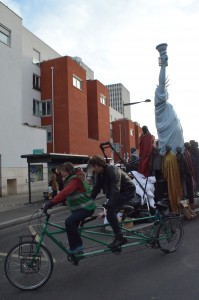 “Not all of us are being affected in the same way by climate change: indigenous people and farmers, poor communities from the South and North are in the first line and are the most affected by these and other impacts of climate change.
“Not all of us are being affected in the same way by climate change: indigenous people and farmers, poor communities from the South and North are in the first line and are the most affected by these and other impacts of climate change.
“Concretely, the governments need to end subsidies to the fossil fuel industry and freeze the extraction of fossil fuels, leaving 80% of known reserves intact. (…) We are not going to wait for the governments for this to happen. Slavery and Apartheid didn’t end because the states decided to abolish them. There were massive mobilizations that left political leaders without another option.”
For its part, Zero Carbon Britain, thinking about the future, assures that the United Kingdom has the technology to generate its own 100% renewable energy to leave the climate clean and habitable for its children and future generations.
The Catalan Joan Martínez Alier and Pablo Solón walked together to the Village. The Bolivian criticized the project of the Paris Accord, which is 48 pages long, and has been presented to ministers to be analyzed during the last week of the COP21.
The text avoids the phrase “fossil fuels” and doesn’t have a proposal to limit extraction of carbon, petroleum or gas or to limit deforestation in the next few years. It doesn’t question the national promises of emissions reductions. A text that approves of the current path in reality enlarges the gap between actual and target emission levels, creating a surplus of 12 gigatons of CO2 in 2020 and around 25 gigatons of CO2 in 2030.
“But if you think that burning the planet is a bad, there are people who are planning to turn this tragedy into a business opportunity,” said Solón. This is exactly what the 3rd article of the Accord does, establishing a Mechanism of Aid for Sustainable Development, which, through its references to articles 6 and 12 of the Kyoto Protocol, surreptitiously introduces carbon markets.
Solón underlines the irony: the Kyoto Protocol is dead. It’s a zombie that has only been ratified by 55 countries, not even by the 144. But concerning carbon markets, its legacy will live on, reinforced by the Paris Accord.
Sent from Paris. Alfredo Acedo is a journalist and director of communications of the UNORCA. He is a contributing writer to the Americas Program https://www.americas.org. This report is part of Americas Program’s COP Chronicles series.
Translated by Simon Schatzberg
For more information:
Visit to the Global Village of Alternatives
https://www.americas.org/es/archives/17953
“The Paris Accords will Burn the Planet”
https://www.americas.org/archives/17774
Social Movements in Paris Refuse to be Collateral Damage to Security Measures
https://www.americas.org/archives/17642
The COP21 in Paris, the Day Before
https://www.americas.org/archives/17669
Challenges of the COP21 and Social Movements
https://www.americas.org/archives/17290
Challenges of the COP21 and Climate Movements



